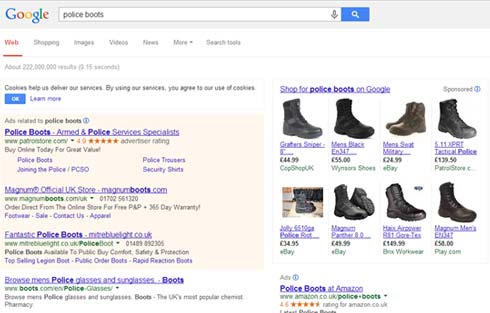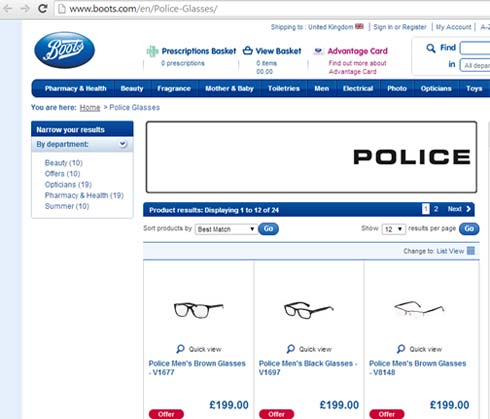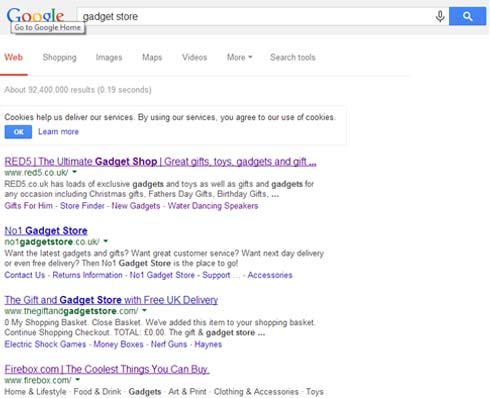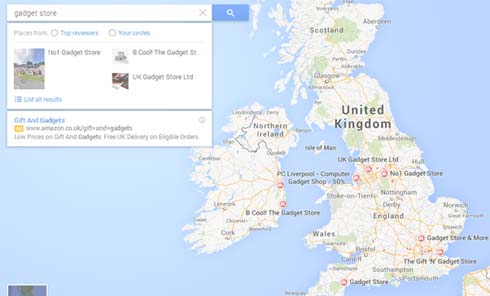How Relevant is Google?
Since I embarked on a career in digital marketing 2 years ago there is one thing I have learnt - this industry is constantly evolving. Therefore if you are unwilling to adapt you can easily find yourself miles behind wondering where the competition has gone. Now I will be turning my attention to Google. For years they have been putting together a set of algorithms that control what qualities a website should have if they are to be displayed in their search results, however, in the process have they lost the common touch?

Google’s 10 Things That We Know To Be True
When Google was a few years old they put together a list of 10 things they knew to be true about their service. These are the following:
- Focus on the user and all else will follow
- It’s best to do one thing really, really well.
- Fast is better than slow.
- Democracy on the web works.
- You don’t need to be at your desk to need an answer.
- You can make money without doing evil.
- There’s always more information out there.
- The need for information crosses all borders.
- You can be serious without a suit.
- Great just isn’t good enough.
In this blog post I will look at two of Google’s key values and see if they are completely factual. If not, well, in the words of Google ‘you can hold us to that’.
Focus On The User And All Else Will Follow
The number 1 philosophy of Google is ‘focus on the user and all else will follow’. I would say that is a pretty sound approach to business, what company does not want to make their customers happy? However wanting to make your customers happy and actually doing so is an entirely different matter.
5 months ago Google launched their latest big algorithm update named Google Hummingbird which was intended to revolutionise the way in which Google is able to rank websites in search results. The main advantage of the Hummingbird update was to increase Google’s ability to understand semantic searches, therefore, provide users with a more relevant and advanced result for a search query. 5 months on let’s put it to the test.
Google Search Results
Ok for our first test I’m going to play the role of a Policeman. I’ve had my pair of standard police boots for way too long now and have come to the decision the time is right to invest in a new pair. At the same time I’ve been told by my colleagues that online shopping is the way forward these days so I decide to get myself involved.
The first thing that I search for is ‘police boots’ and the following search results appear:

So as you can see I have been provided with a good selection of results, the majority of them paid. But as a new shopper online I’m going to avoid the adverts and see what other websites are out there so I click on the first organic result provided to me and the following website appears.

If this was the first time I had used Google and I was provided with this page as the top result for my search ‘police boots’ I wouldn’t find it very relevant. Unless of course I harboured ambitions to look like Simon Pegg & Nick Frost in Hot Fuzz. Instead the question I would be asking is why I am being directed to this site when it has nothing to do with ‘police boots’? Especially since every other site on the page is relevant to my search query.
Enough of being a Policeman and back to being a Digital Marketer, this search result could give a clear indication that Google are placing more emphasis on branded search terms. Police and Boots are both large UK brands, however, for this search query putting them both together and giving the user the ‘Police Glasses’ page on Boots’ website just isn’t going to cut it.
Google Map Results
Test number 2. If I’m looking for a store that sells gadgets a reasonable search query the average person would type in to Google would be ‘gadget store’. From this I would expect a list of local gadget stores close to my location as I know Google have updated their search results to include local businesses. However when I make this query this information is not available to me as shown below.

I must add at this point that all of the above websites are reputable online gadget stores and if you were to shop online they would be relevant, however, I want to find a gadget store near where I live.
No matter Google has a ‘Maps’ option. Surely this will be able to show me my closest gadget store on the map, let’s see…

Bearing in mind I typed in this search from the ThoughtShift offices in Brighton the fact the nearest store Google’s provided me in their map results is in Canvey Island (from a shop I have never interacted with online before) shows there is some way to go before the semantic search function is complete.
Google News Results
Another area where Google has come under criticism from the digital marketing community has been from their news results for the new Lego Movie. Read more about this individual story on Search Engine Land. More concerning from Google’s point of view is when I completed a search for ‘watch Lego movie online’ a different website was the top feature in Google UK’s news results to the one in Google US’ search results (see below).

This shows that as well as Google.com the Google.uk search engine has been manipulated by hackers to show results that are highly irrelevant. Worryingly the Google News ranking system is based on websites that have a high authority in particular subjects, however, from viewing the Inland Valley website it is clear that they do not offer expertise in the film industry. So regardless of Inland Valley falling victim to being hacked the question must be asked why are they ranking at number 1 in Google News?
You Can Make Money Without Doing Evil
The sixth point on the list of 10 things Google knows to be true is ‘You can make money without doing evil.’ I’m sure this statement would make a few digital marketers laugh especially those who specialise in SEO. From my experience in the industry to date I can understand why Google roll out continuous Penguin, Panda and now Hummingbird updates. They want to eradicate websites that are low quality because they're of little value to anyone using the web and so do I, it makes the online world a better place.
I can also understand why Google would want more people to use their paid search service. That makes complete sense. What business wouldn’t want a person to use one of their services that increases the businesses revenue?
However I do take an issue with Google acting like they are the knight in shining armour when some of their business decisions in the past year completely contradict the above statement. Let’s look at a few more examples.
1. Not Provided
One of Digital Marketers biggest annoyances was when Google decided that it was going to stop providing keyword information regarding non paid search traffic. By doing this I doubt they have genuinely considered the opinion of the people who want to make the web a better place.
In my opinion all the introduction of not provided has achieved is Google making it a harder job for business owners who want to make their site better for their visitors.
One of Google’s mantras is we want people to find the best content on the web for their searches. That’s brilliant Google but who is going to write all this great content across billions of websites across the world? You? No I didn’t think so. So how are business owners going to know what content their users are finding engaging if they don’t know what people are typing in to search engines to find their website?
There are alternative ways of finding the most engaging areas of your site but as the keywords people are searching for are becoming longer tail I fear this will become more difficult in the future.
On a side note, I believe introducing not provided is actually a detriment to Google’s business model. For if they are restricting people's knowledge of what is being searched online how are people going to create the high quality content to satisfy Google’s customers? Essentially they are digging their own grave for lower quality content in their search results increasing the chances that people will use other search engines.
2. PPC
Research completed in 2013 by Cloud IQ showed us that apparently 85% of search marketing professionals’ main focus in 2014 will be conversion optimisation. This invariably will lead to an increase in people using PPC services. Of the people who had a PPC strategy in 2013 84% believed their current spend was not high enough and 72% were planning to increase their PPC spend in 2014.
So who is going to benefit the most from businesses spending more on PPC services? The simple answer is Google. Google AdWord’s is predicted to have a 73% share of all PPC usage in 2014. Hence why it is hardly surprising why Google are restricting the amount of information non paid customers receive in order to drive them to their paid services.
Conclusion
To conclude I realise I have been critical of some of the aspects of Google’s search results and philosophies throughout this post. The fact of the matter is Google do provide a good service overall which is why they dominate the search market at this moment in time. However let’s go back to number 10 of things that Google know to be true which is ‘great is not good enough’.
How are Google going to improve as a business if people like me who use their services on a daily basis don’t once in a while turn around and say ‘actually you could do this better?’ In business sometimes when you are monopolising the market to such an extent that your brand name has become an adjective, as my uncle would say ‘you just Google it’, then maybe there is a possibility for a bit of complacency to set in as shown in my examples above.
Just a thought…
Follow my contributions to the blog to find out more about digital strategy, content marketing & SEO or sign up to the ThoughtShift Guest List, our monthly email, to keep up-to-date on all our blogposts, guides and events.
